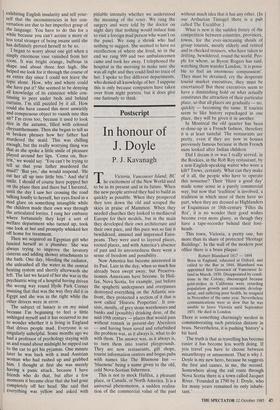Postscript
In honour of
J. Doyle
P. J. Kavanagh
Now America has become interested in its Past. Late in the day, when so much has already been swept away, but Preserva- tionists Americans have become. In Hali- fax, Nova Scotia, for example, just before the spaghetti underpasses and overpasses destroyed everything on the Atlantic sea- front, they protected a section of it that is now called 'Historic Properties'. It con- sists, mostly, of grey stone warehouses and banks and (possibly) drinking dens, of the mid-19th century — places that would pass without remark in present-day Aberdeen — and having been saved and refurbished the problem was, as it always is, what to do with them. The answer was, as it always is, to turn them into tourist playgrounds. They are now restaurants, gift shops, tourist information centres and bogus pubs with names like The Bluenose Inn 'bluenose' being a name given to the old, cold Nova-Scotian fishermen.
This is not to mock Halifax, a pleasant place, or Canada, or North America. It is a universal phenomenon, a sudden realisa- tion of the commercial value of the past
without much idea that it has any other. (In our Arthurian Tintagel there is a pub called The Excalibar.)
What is new is the sudden frenzy of the competition between countries, provinces, towns, for the ever-increasing shoals of group tourists, mostly elderly and retired and in checked trousers, who have taken to drifting, bewildered, round the world. Peo- ple for whom, as Byron Rogers has said, watching them wander London, 'it is possi- ble to feel an enormous compasssion'. They must be detained, cry the desperate tourist market executives, they must be entertained! But these executives seem to have a diminishing hold on what actually constitutes the attraction of their particular place, so that all places are gradually — no, quickly — becoming the same. If tourists seem to like history repackaged in one place, they will be given it in another.
In Montreal the old quarter has been re-done-up in a French fashion, therefore it is at least tasteful. The restaurants are pretty, even if they are now in houses previously famous because in them French nuns looked after Indian children.
Did I dream it or was I really served, in the Rockies, in the Rob Roy restaurant, by a non-English-speaking waiter who wore a kilt? Trews, certainly. What can they make of it all, the people who have to operate this nonsense? Their 'Have a good day' made some sense in a purely commercial way, but now that 'tradition' is involved, a tradition in which most of them have no part, when they are dressed as Highlanders or Esquimaux or 18th-century 'Fines du Roi', it is no wonder their good wishes become even more glassy, as though they have a tape-recorder behind their fore- heads.
This town, Victoria, a pretty one, has more than its share of protected 'Heritage Buildings'. In the wall of the modem post office there is a brass plaque:
Robert Blanshard 1817 — 1894 Born in England, educated at Oxford, and called to the Bar in 1844, Blanshard was appointed first Governor of Vancouver Is- land in March, 1850. Disappointed by condi- tions in the Colony, discouraged because gold-strikes in California were retarding population growth and economic develop- ment, and suffering poor health, he resigned in November of the same year. Nevertheless communications were so slow that he was unable to leave Victoria until September 1851. He died in London.
There is something charmingly modest in commemorating such patrician distaste in brass. Nevertheless, it is pushing 'history' a bit hard.
The truth is that as travelling has become easier it has become less worth doing. If you travel you have to choose between misanthropy or amusement. That is why J. Doyle is my new hero, because he suggests the first and causes, in me, the second. Somewhere along the rail route through Nova Scotia there is a town called Jacquet River. 'Founded in 1790 by J. Doyle, who for many years remained its only inhabi- tant.'






















































 Previous page
Previous page